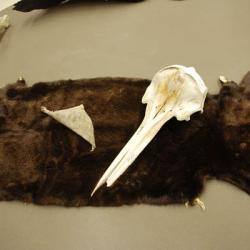Source Institutions
Source Institutions
Add to list Go to activity
Activity link broken? See if it's at the internet archive

In this activity, learners examine body parts (including skin, scales, and skulls) from fish, mammals and reptiles. Questions are provided to help encourage learner investigations. Several activities are described, including object identification (what animal and what part of the animal?), free sorting of the objects, and a discussion of similarities, differences, and protective functions of the animal parts. It's written for use as a cart demo in a museum or aquarium, but could be done anywhere animal body parts are available.
- Under 5 minutes
- 10 to 30 minutes
- Over $20 per group of students
- Ages 4 - adult
- Activity, Lesson/Lesson Plan
- English
Quick Guide
Materials List (per group of students)
- River otter pelt
- Seal Skin
- Sturgeon skin
- Horseshoe crab molt
- Assorted crab molts (blue, spider, hermit)
- Sea Turtle scutes
- Sea Turtle shells
- Fish scales
- Fish vertebrae
- Alligator and crocodile skulls
- Dolphin skull
- 8 large clear Rubbermaid containers
- Pictures of animals
Subjects
-
Life Sciences
-
Diversity of Life
- Animals
- Classification
-
Diversity of Life
-
The Nature of Science
-
The Scientific Process
- Asking Questions
- Formulating Explanations
-
The Scientific Process
Audience
To use this activity, learners need to:
- see
- touch
Learning styles supported:
- Involves hands-on or lab activities
Other
Includes alignment to state and/or national standards:
This resource is part of:
Access Rights:
- Free access
By:
Source Collection
- COSIA
Rights:
- All rights reserved, Virginia Aquarium and Marine Science Center, 2009
Funding Source:
- National Science Foundation, NSF OCE-0731338
